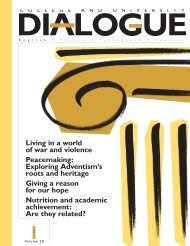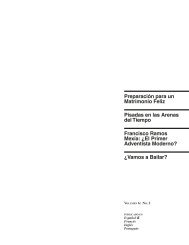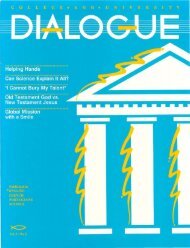Faith, reason, and the educated Christian Creationism - College and ...
Faith, reason, and the educated Christian Creationism - College and ...
Faith, reason, and the educated Christian Creationism - College and ...
Create successful ePaper yourself
Turn your PDF publications into a flip-book with our unique Google optimized e-Paper software.
notes, or doing a project. A conciliator<br />
prays, counsels, <strong>and</strong> assists <strong>the</strong> student<br />
through <strong>the</strong> process.<br />
Ano<strong>the</strong>r example: A church elder is<br />
involved in an adulterous affair. One of<br />
<strong>the</strong> parties seeks conciliation. There is<br />
prayer, Scripture study, paperwork, <strong>and</strong><br />
a goal to bring glory to God, serve o<strong>the</strong>rs,<br />
<strong>and</strong> grow to be more like Jesus. This<br />
more complicated process includes<br />
counseling, confession, repentance, forgiveness,<br />
<strong>and</strong> redemptive discipline.<br />
With support <strong>and</strong> underst<strong>and</strong>ing, relationships<br />
can be healed, marriages<br />
saved, <strong>and</strong> <strong>the</strong> community of believers<br />
streng<strong>the</strong>ned.<br />
■ What kind of cases do you see most frequently?<br />
Because I am involved with training<br />
for Young Peacemakers, I provide in-service<br />
training for faculty, parents, students,<br />
<strong>and</strong> churches. I also conduct<br />
practicums to equip o<strong>the</strong>rs to be trainers.<br />
I often deal with disruptive behaviors<br />
of students <strong>and</strong> help schools design<br />
rules <strong>and</strong> processes to promote peace<br />
<strong>and</strong> positive relationships. Peacemaker<br />
Ministries has developed a curriculum<br />
for grades 2-6 <strong>and</strong> is completing one for<br />
grades 7-9. I also work with families facing<br />
divorce, estate settlement, or workplace<br />
issues. We also draft conciliation<br />
clauses for contractual agreements.<br />
■ The seminar seems like something we<br />
could all benefit from. Is it recommended for<br />
assistance in our private lives?<br />
Exactly. The seminar opens with <strong>the</strong><br />
“slippery slope” concept, explaining how<br />
people react to conflict with escape or attack<br />
responses. Scripture offers resolutions<br />
beginning with overlooking an offense<br />
(Proverbs 19:11), through <strong>the</strong><br />
steps of Mat<strong>the</strong>w 18:15-20, <strong>and</strong> ending<br />
with redemptive church discipline by<br />
“treating <strong>the</strong> offender as an unbeliever.”<br />
That last step means that <strong>the</strong> person<br />
“doesn’t get it,” <strong>and</strong> we start all over.<br />
■ Tell us what you mean by conflict.<br />
Dialogue 15:3 2003<br />
We define conflict as a “difference in<br />
opinion or purpose that frustrates someone<br />
else” as described in James 4:1-2.<br />
The Holy Spirit convicts of sin (John<br />
16:8) <strong>and</strong> a conflicted person will realize<br />
that genuine peace may be found only<br />
through Jesus Christ.<br />
■ How do you educate people about reconciliation<br />
in a troubled congregation?<br />
We begin with a seminar <strong>and</strong> invite<br />
all members <strong>and</strong> require leaders to attend.<br />
We also invite non-attending <strong>and</strong><br />
former members. Concurrently, we may<br />
also have a Youth Peacemaker program.<br />
We <strong>the</strong>n schedule interviews <strong>and</strong> encourage<br />
reconciliation through mediation.<br />
We usually have a board meeting<br />
to discuss <strong>the</strong> ongoing application of<br />
<strong>the</strong> principles. We like to end with a<br />
church family “Celebration of Reconciliation”<br />
that includes communion. I<br />
write a spiritual report detailing <strong>the</strong> process,<br />
list recommendations, <strong>and</strong> keep in<br />
contact during <strong>the</strong> year to support <strong>and</strong><br />
encourage accountability.<br />
■ How do most people respond to <strong>the</strong> process?<br />
I know churches <strong>and</strong> organizations<br />
that have peacemaking seminars <strong>and</strong><br />
small groups to train members. They<br />
encourage confession, repentance, <strong>and</strong><br />
forgiveness to heal relationships. Each<br />
leader <strong>and</strong> member is held to a high degree<br />
of accountability.<br />
We find that most need information<br />
<strong>and</strong> direction about this process <strong>and</strong> are<br />
grateful when <strong>the</strong>y experience God’s<br />
peace in relationships. <strong>Christian</strong>s should<br />
be encouraged to take unresolved conflicts<br />
to <strong>the</strong> church family.<br />
■ Peacemaking also has political aspects.<br />
How can citizens anywhere in <strong>the</strong> world<br />
bring <strong>the</strong>se principles into use in <strong>the</strong>ir secular<br />
communities?<br />
When people study God’s way of<br />
dealing with conflict, <strong>the</strong>y immediately<br />
find opportunities to address issues.<br />
Micah 6:8 gives an answer to a <strong>Christian</strong><br />
citizen’s role: “To do justly, to love mercy,<br />
<strong>and</strong> to walk humbly with your God”<br />
(NIV). War <strong>and</strong> conflict in <strong>the</strong> world<br />
had its root in Lucifer’s assault against<br />
God’s government. God urges His followers<br />
to seek peace. The Great Controversy<br />
model shows how God deals with conflict.<br />
He did not abuse His authority. He<br />
offered reconciliation. Through Christ,<br />
He gave us <strong>the</strong> ministry <strong>and</strong> message of<br />
reconciliation. We are His ambassadors<br />
(2 Corinthians 5:17-21).<br />
Peacemaking principles are crucial in<br />
every aspect of life. A common source of<br />
conflict is rebellion against authority in<br />
<strong>the</strong> church, government, family, or<br />
workplace. All legitimate authority has<br />
been established by God for <strong>the</strong> purpose<br />
of maintaining peace <strong>and</strong> order (Romans<br />
13:1-7). When a person in authority<br />
instructs you to do something that<br />
you believe is unwise, unfair, or sinful, it<br />
is appropriate to make a respectful appeal<br />
<strong>and</strong> negotiate solutions (Es<strong>the</strong>r 7:1-<br />
6; Daniel 1:6-16).<br />
If our witness is to be effective, we<br />
should have something to show <strong>the</strong><br />
world that it does not possess. In His<br />
Sermon on <strong>the</strong> Mount, Jesus spelled out<br />
<strong>the</strong> differences between worldly troublemakers<br />
<strong>and</strong> <strong>Christian</strong> peacemakers. The<br />
Golden Rule is still valid: “‘So in everything,<br />
do to o<strong>the</strong>rs what you would<br />
have <strong>the</strong>m do to you’” (Mat<strong>the</strong>w 7:12,<br />
NIV).<br />
■ Should peacemaking be taught in Adventist<br />
schools?<br />
Teaching students to respect, work<br />
with each o<strong>the</strong>r, <strong>and</strong> address issues is<br />
<strong>the</strong> foundation for <strong>the</strong>ir leadership.<br />
Those schools that are beginning to<br />
teach <strong>and</strong> implement <strong>the</strong>se principles<br />
are being blessed.<br />
I believe we should offer more training<br />
in conflict resolution with biblical<br />
peacemaking in our colleges <strong>and</strong> universities.<br />
Most graduating students don’t<br />
have <strong>the</strong> skills needed to deal with inev-<br />
Continued on page 31.<br />
21

















